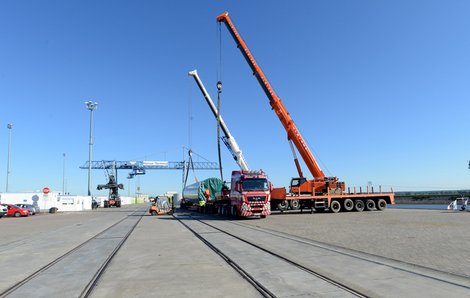Multi-modal solutions for the mobility of the future

Modern, intelligent, environmentally-friendly – Saxony-Anhalt is developing innovative transport systems
Saxony-Anhalt is situated in the heart of Germany and in the centre of the European economic area. It is a place where the distances to international markets and customers are short. Saxony-Anhalt is therefore a key transport and logistics hub between the east and west. Its closely interfaced network of road, rail, water and air links is unique.
Its transport network consists of more than 11,000 kilometres of modern roads, with links to the pan-European A2, A9, A14, A38 and A143 motorways. The region is home to some 600 kilometres of inland waterways, including the river Elbe, the Mittelland canal, the Elbe-Havel canal, or the Magdeburg waterways intersection, which connect with 18 ports and shipment terminals. The inland ports of Magdeburg, Aken and Dessau-Rosslau are important inland hubs for the seaports of Wilhelmshaven, Bremerhaven, Hamburg, Lübeck and Rostock.
Around 3,100 kilometres of railway lines create one of the highest density railway networks in the world. By 2018, the current marshalling yard in Halle/Saale will be converted into one of the most modern railway facilities in Europe at a cost of some 146 million Euros. Leipzig/Halle airport is the second biggest airport for freight in Germany, and is in the top 10 of European freight airports. The parallel take-off and landing runway system, with each runway 3,600 metres in length, enables the world's biggest aircraft – the Airbus A 380 and the Antonov 225 – to take off and to land. The airport handles more than 910,000 tonnes of freight per year.
The logistics and transport services sector in Saxony-Anhalt currently has 61,000 employees, 3,000 of whom work for logistics companies. Each year, they move roughly 370 million tonnes of goods, products and raw materials, generating a total annual turnover of approximately 2.8 bn. Euros.
The increasing internationalisation and growing traffic volume in the transportation of both people and goods, paying close consideration to climate and environmental protection, will play a major role in the future development of the logistics sector. By 2030, the German federal government and the federal state of Saxony-Anhalt want to invest another two billion Euros in a modern, intelligent and environmentally-friendly transport infrastructure.
In recent years, leading retail chains and their distribution businesses have chosen to make the federal state their home. These include EDEKA, Ernstings Family, Hermes Fulfilment (Otto Group), Kaufland, Lidl, Netto, REWE, Rossmann and Mobis Parts Europe, a supply and distribution centre for automotive components of Hyundai and Kia. The leading logistics and transport companies who have chosen to locate in Saxony-Anhalt include DHL and the Deutsche Post, Dachser, Schenker, Hellmann, Rosner Logistik, Finsterwalder, Hoyer, Offergeld, Dettenthaler and the Nagel Group.
Saxony-Anhalt is able to offer sectors which have considerable market potential for manufacturers and shipping and logistics companies. The chemicals industry, mechanical and plant engineering, the automotive industry, the food industry, agriculture, energy production, renewable energy, the wood and paper industry, mining, and stone and clay quarrying all feature prominently in the federal state.
The company Mitteldeutsche Eisenbahn GmbH is one of the businesses to have become a driver of innovation on the logistics market. MEG is the first company working with shunting locomotives in Europe to use a fleet of hybrid locomotives. This makes it a leader in the reduction of harmful emissions and noise pollution.
The company Hoyer GmbH is one of the world's market leaders for the transportation of liquids, and handles the entire container logistics for the Dow Olefinverbund in Schkopau. With the growth of its market in the direction of Eastern Europe, 93,000 containers are now handled here, and the terminal has hit the limits of its capacity. Hoyer has solved the problem by building a sustainable combo terminal with an annual capacity of 130,000 containers.
The inland shipping line Börde Container Feeder GmbH offers its customers the software-supported tracking of the transport route. The logistics has been organised so that the transport largely takes place on the waterways and the pressure is therefore taken off the roads.
With the motto of “networked logistics for a strong business location”, Saxony-Anhalt combines its appropriate expertise and develops it further on a continuous basis. The Nahverkehrsservice Sachsen-Anhalt GmbH is an important player and partner for the implementation of an intelligent, low emissions transport infrastructure. NASA develops customer-friendly, efficient ICT services that cut across the different methods of transport.
Saxony-Anhalt is also a centre for research into modern logistics processes and systems. The Otto von Guericke University Magdeburg is home to the Institute of Logistics and Material Handling Systems. The Martin Luther University of Halle-Wittenberg has a chair for production and logistics. The four universities in the federal state offer courses which cover the topics of logistics management, the logistics business and infrastructure as well as logistics systems and networks.
The universities and institutes are combining their fundamental research with industrial contract research. For this purpose, the federal state of Saxony-Anhalt and the Otto von Guericke University have embarked on a shared project: the Galileo test site is a development and experimental laboratory for orientation, navigation and communication in the area of transport and logistics. At this test site, research and practise come together to manage the future challenges in the area of telematics, logistics, navigation, digitalisation and ICT systems. Application-oriented solutions are conceptualised, developed and realised in partnership.
New forms of mobility, efficient transport management and the intelligent interfacing of production and logistics are all areas in which Saxony-Anhalt is a key innovator.

